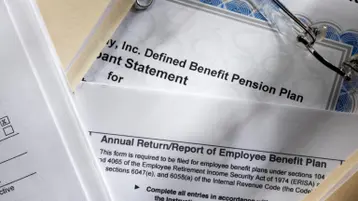ACA Fact Sheet: Who is a Seasonal Employee?

Table of contents
- 1.Seasonal Employee
- 2.Employees that are Not Considered Seasonal
- 3.Benefits Waiting Periods
Under IRS and Treasury Department regulations, seasonal employees are not considered "full-time," benefits eligible even if they are expected to work 30 or more hours per week. But how do you properly classify an employee as seasonal?
The answers to the two questions below will determine if you can classify an employee as seasonal:
- Do employees in the position typically work for a period of six months or less?
- Does the period of employment begin in approximately the same part of the year (e.g. summer, winter or holiday season)?
If you answered "Yes" to both questions above, your employee likely is a seasonal employee, regardless of how many hours the employee is expected to work each week. If you determine the employee is an seasonal employee, you do not have to classify the individual as full-time, benefits eligible (subject to the benefits waiting period, if any) as of the date of hire.
An applicable large employer (ALE) will generally not be liable for ACA employer shared responsibility penalties if it fails to offer health coverage to seasonal employees during an initial measurement period, even if those employees end up working full-time hours during that measurement period. For more information on how seasonal employee hours are measured, please refer to the ACA Fact Sheet: Full-Time, Variable Hour and Seasonal Employees.
There’s a misconception that seasonal employment is determined by the number of hours worked per week; this is not the case and hours per week will vary significantly between different types of seasonal jobs. In certain service industries, such as snow plowing, a single week of work can involve multiple, 10+ hour shifts back-to-back if the weather is severe enough. Seasonal workers may also earn different wages in different pay periods, as the hours they work may be tied to external circumstances. Overtime pay may be applicable to certain seasonal positions; refer to your state’s rules and regulations on this topic.
Temporary employees may or may not be seasonal employees. Temporary jobs are available for specific time periods and are not directly related to seasonal fluctuations in business. Seasonal jobs, as we’ve discussed at length, will involve specific seasons or seasonal events, such as the tourism season in the southeastern United States or the retail holiday season. Hiring seasonal employees may be a regular part of doing business in certain industries, so understanding which employees are which will ensure compliance and help minimize risk.
As a reminder, TriNet does not provide legal advice. You will want to consult with your legal counsel to ensure that your notifications and contracts with seasonal employees contain appropriate protective language. For example, you will want to document that the newly hired employees understand the job is expected to end at a certain date.
Below are several examples of employees that may be, and may not be, seasonal employees under the ACA definition1. All examples assume the employee is expected to work more than 30 hours per week.
Seasonal Employee
- College interns hired each year from June through mid-August, during summer break
- Accountants solely employed during annual tax season, from January through April 15
- Retail clerks employed from November through mid-January, during the holiday season
- Servers hired by restaurants and resorts during Florida tourist season, from December through April
Employees that are Not Considered Seasonal
- Graduate interns hired for a 12 month internship beginning in June of each year
- Computer programmers hired for 2 months to assist in completing a special project
- Consultant hired to lead a one-time process improvement project expected to last 5 months
- Temporary call center employees hired to assist with an anticipated spike in call volume, period of employment unknown
Benefits Waiting Periods
Remember that any newly hired full-time employee that is not considered seasonal is still subject to the waiting period, if any, selected by your company. If your company frequently hires "short-term" employees that do not meet the definition of a seasonal employee, you may want to consider a longer waiting period before company benefits are effective. Under ACA, the maximum waiting period is 90 days.
1 Examples are for informational purposes only. The facts and circumstances in each situation will determine if an employee is considered seasonal for purposes of ACA employer shared responsibility penalties.
TriNet does not provide legal, tax or accounting advice.

TriNet Team
Table of contents
- 1.Seasonal Employee
- 2.Employees that are Not Considered Seasonal
- 3.Benefits Waiting Periods






